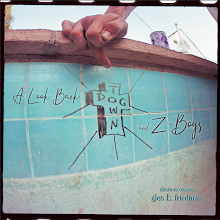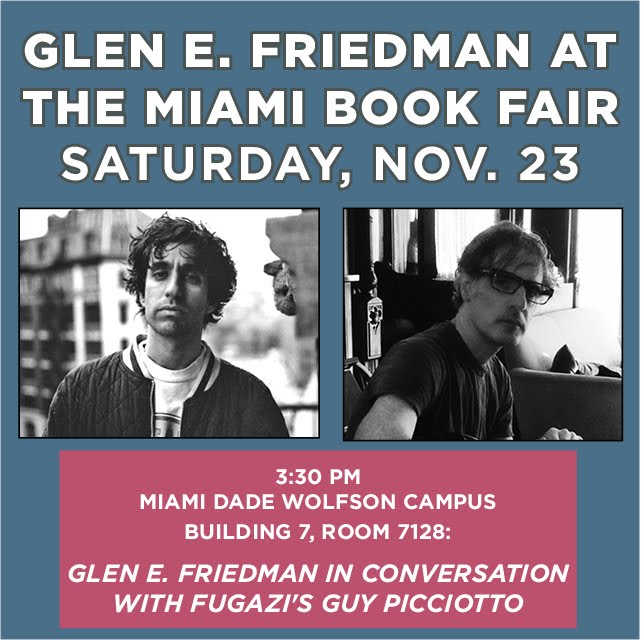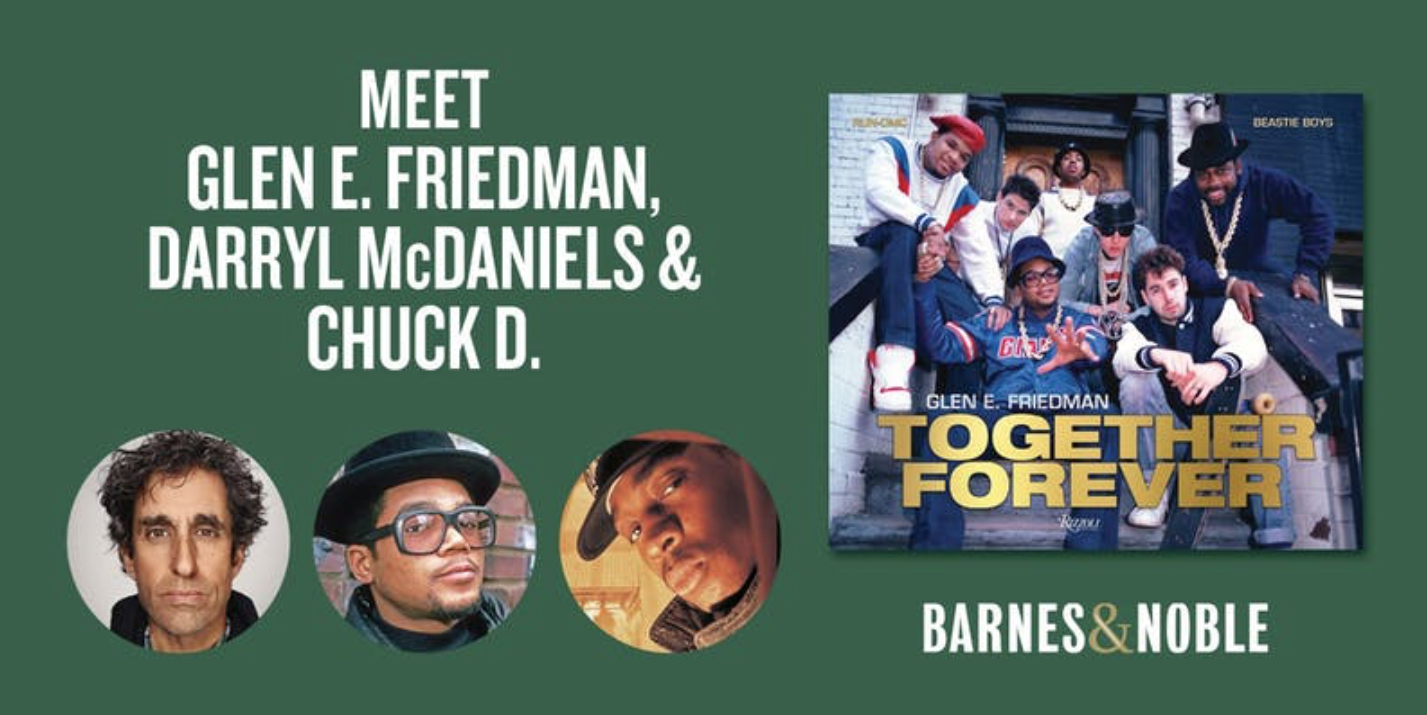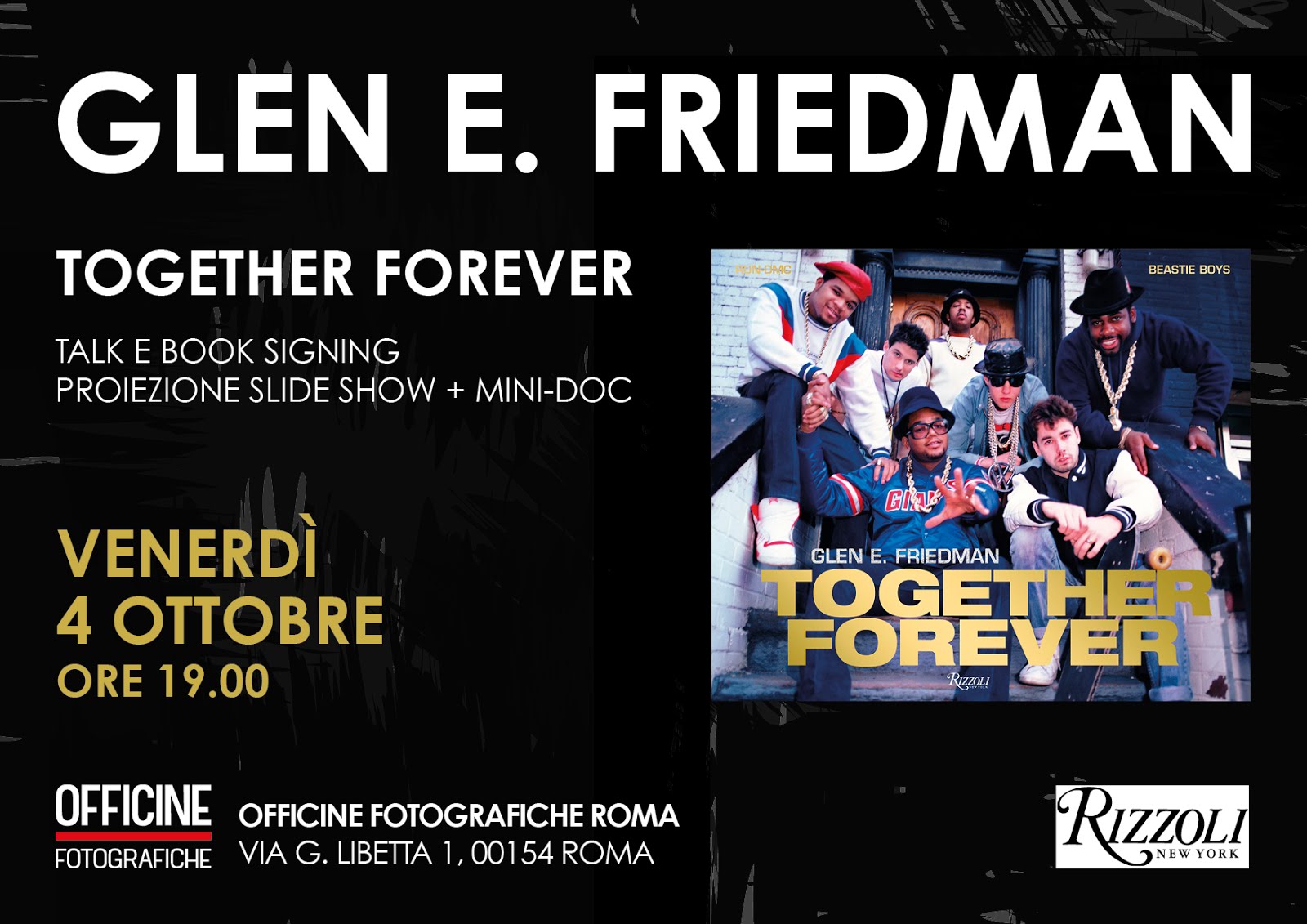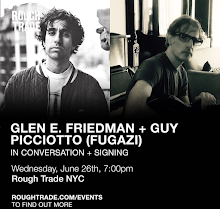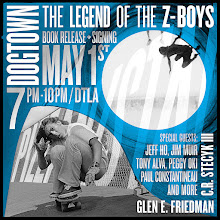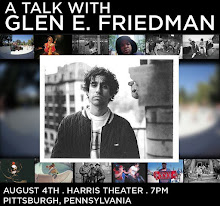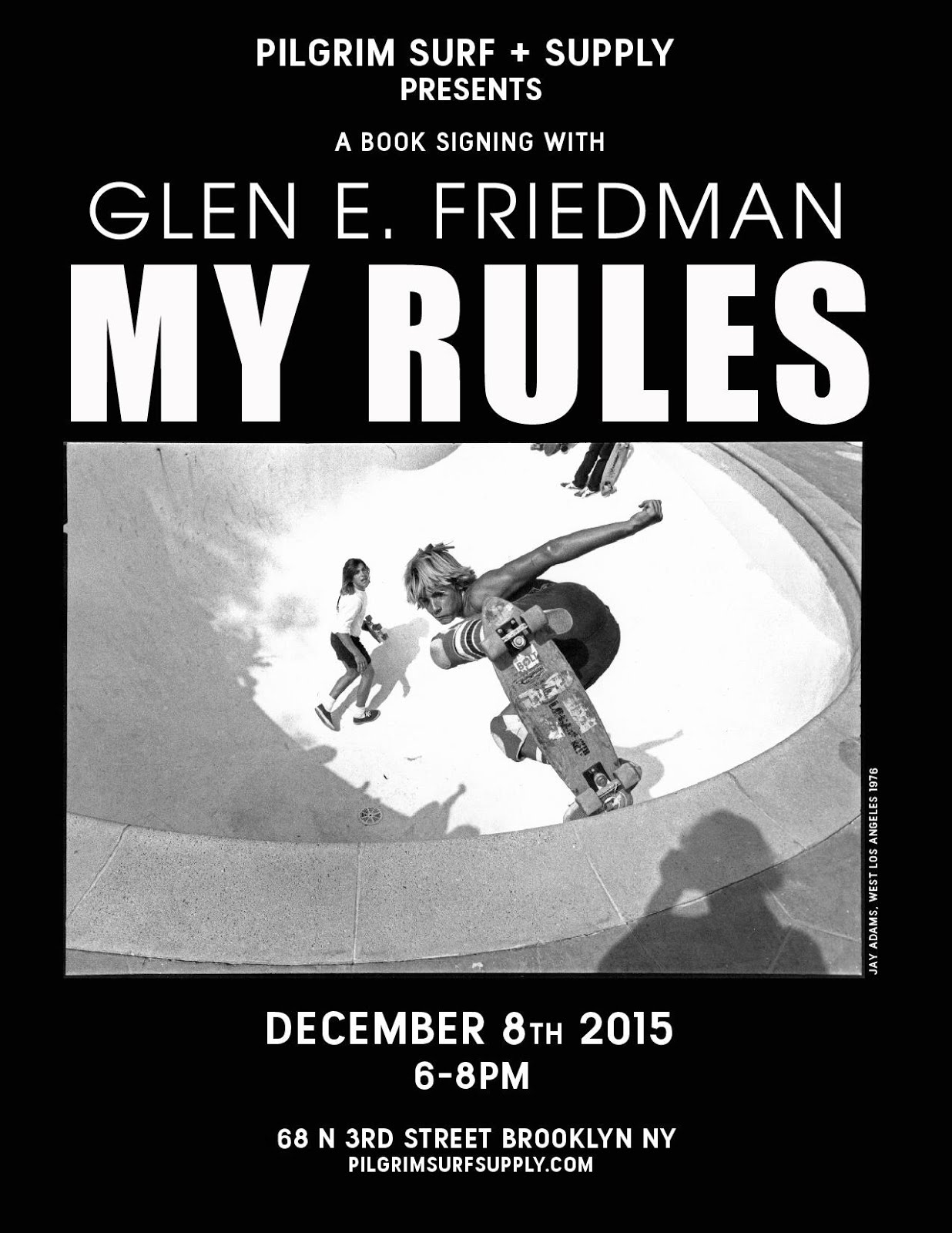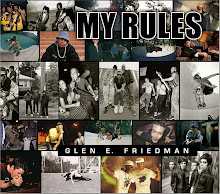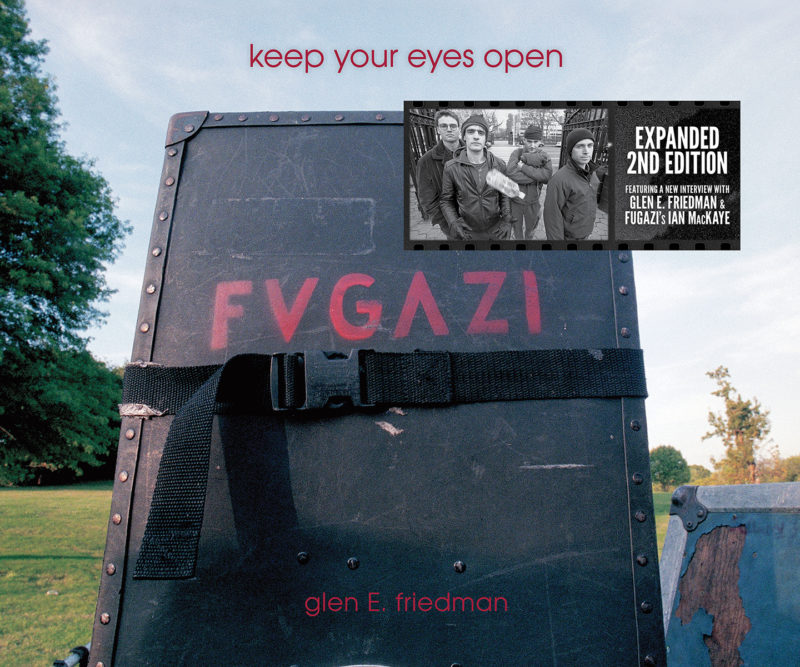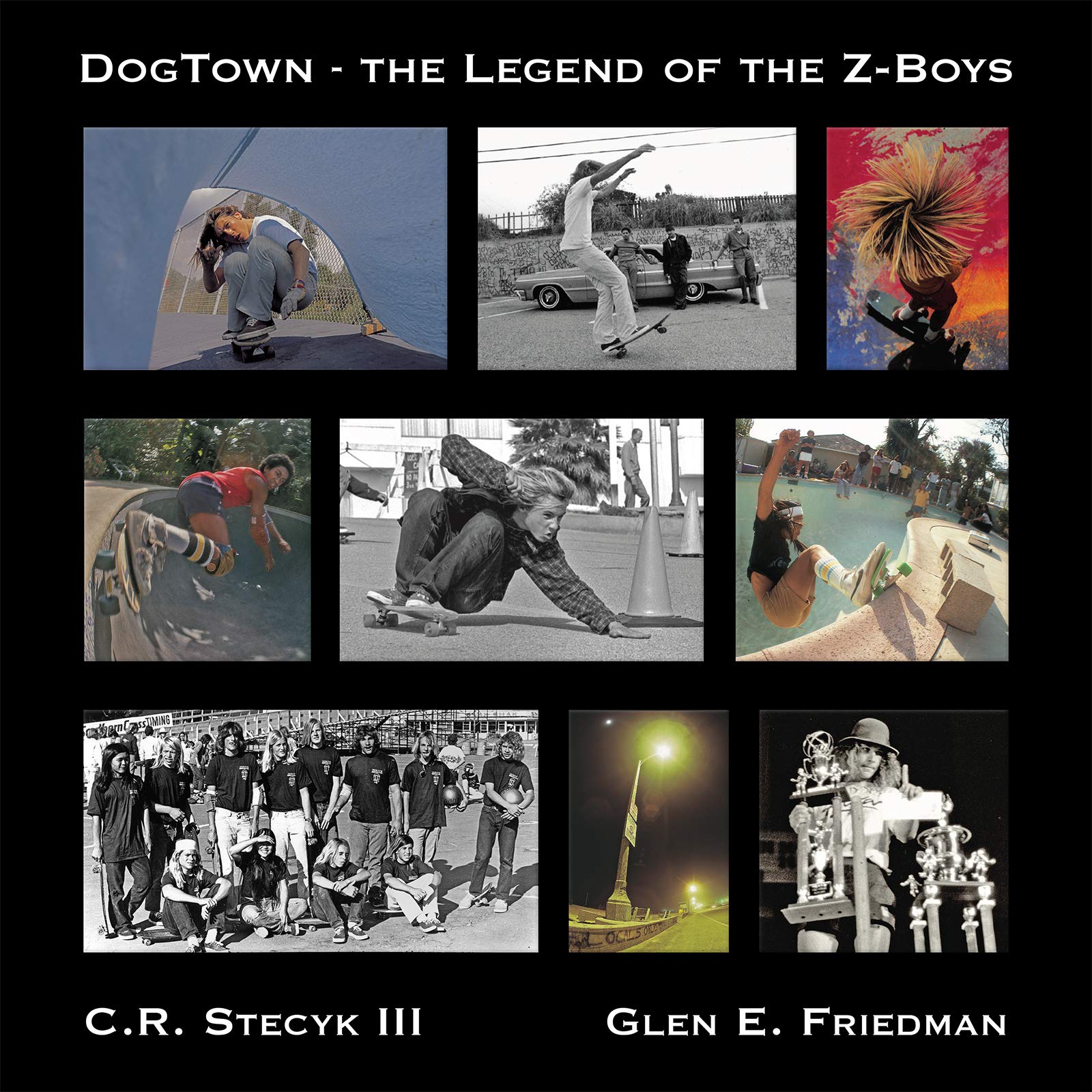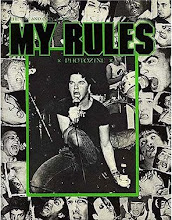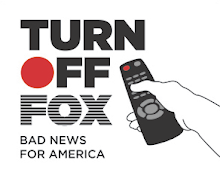Friday, September 30, 2016
Brian Anderson on Being a Gay Professional Skateboarder
Bonus from 2012:
Labels:
coming out,
gay,
gnarly,
skateboarding,
thrasher
Thursday, September 29, 2016
TRADING CARDS OF SOME DANGEROUS MINDS, DEEP THINKERS & RADICAL INTELLECTUALS
from Dangerous Minds


For those with an interest in big ideas, these trading cards from Theory.org should fire up your neurotransmitters.
Between 2000-2001, a set of twelve trading cards was released monthly via David Gauntlett’s website Theory.org. This original set of cards featured theorists (and their concepts) from the world of social and cultural theory, gender and identity, and media studies. The first out of the pack was British social theorist Anthony Giddens who devised the theory of structuration and wrote the book on The Third Way. This was followed by theorist Judith Butler whose book Gender Trouble argued that “biological” sexes were just as much as a social construct as gender. Then came the great controversial French thinker Michel Foucault with his ideas about sexuality, gender and power structures. The deck included some interesting choices like artists Tracey Emin, Gilbert & George and concepts like Postmodernity and Psychoanalysis.
This official set of twelve trading cards was thought by some to lack a few key players and its release inspired various academics, students and alike to produce their own cards. These additions included Karl Marx, Carl Jung, Simone de Beauvoir, Edward Said, Germaine Greer, Walter Benjamin and Marcel Duchamp.
Described as “Creative knowledge you can put your pocket™” these cards can be used to play a game of trumps—in which players can match strengths, weaknesses and special skills. For example, Foucault’s special skill of happily rejecting old models and creating new ones, might not quite beat Duchamp’s ability to confuse the hell out of everyone.
The full set is below—but if you want to own a set of these super brainy trading cards (and who wouldn’t?) then deal yourself in by clicking here.
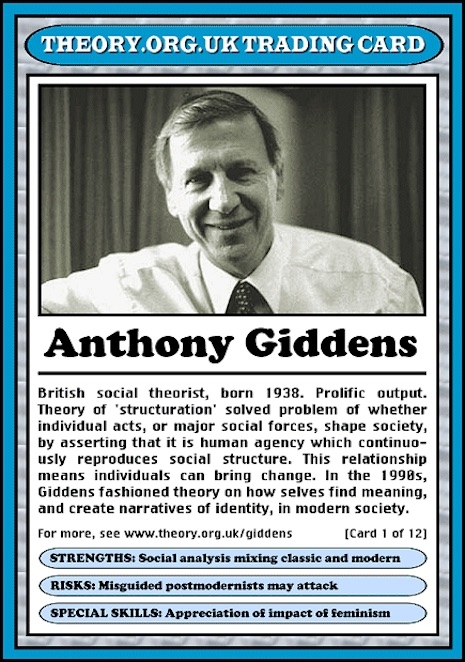
#1 Anthony Giddens—British social theorist.
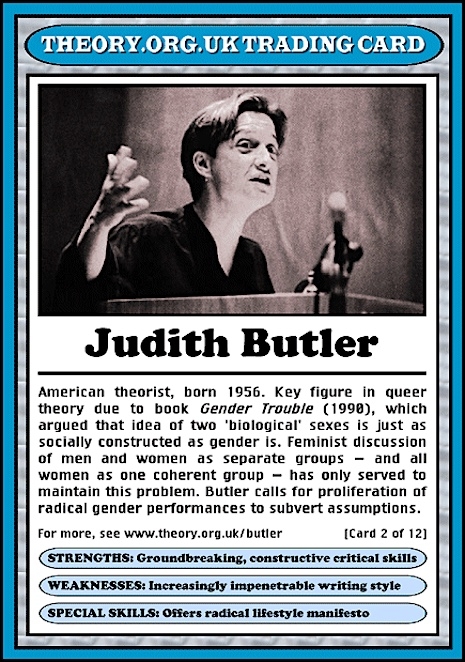
#2 Judith Butler—American philosopher and gender theorist.
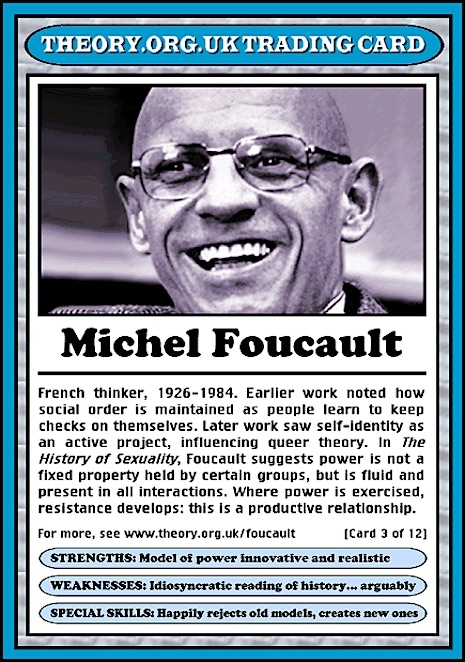
#3 Michel Foucault—French philosopher, theorist, philologist and literary critic.
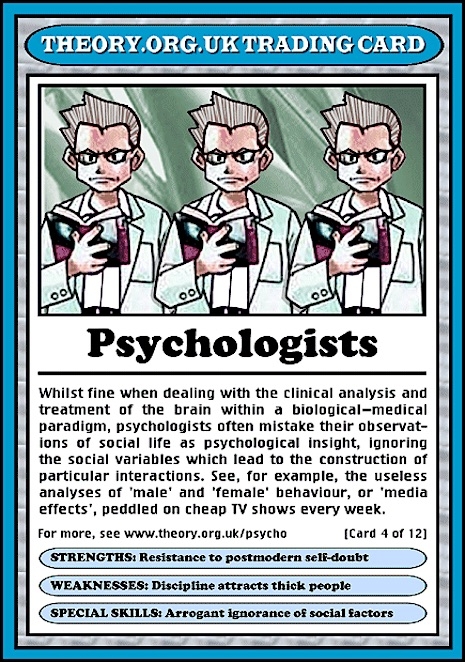
#4 Psychologists.

#5 Postmodernity.
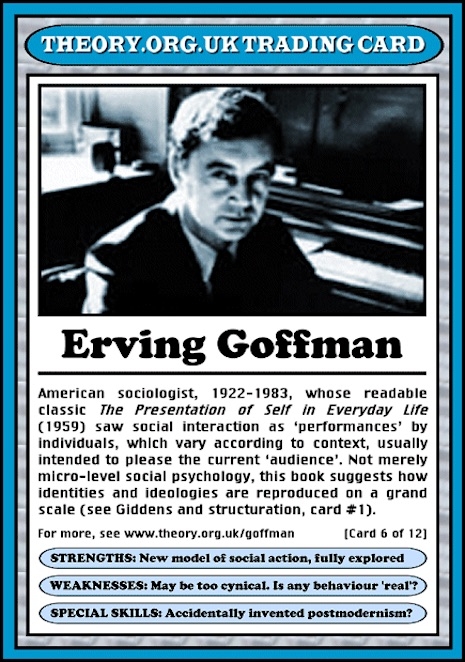
#6 Erving Gofffman—American/Canadian sociologist and writer.
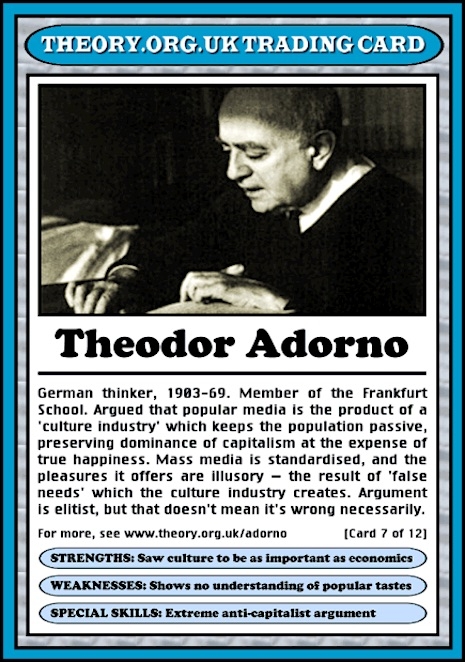
#7 Theodor Ardorno—German philosopher, sociologist and composer.
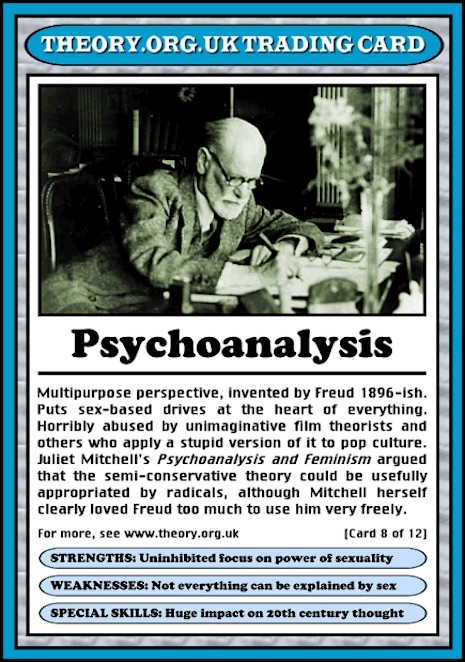
#8 Psychoanalysis.
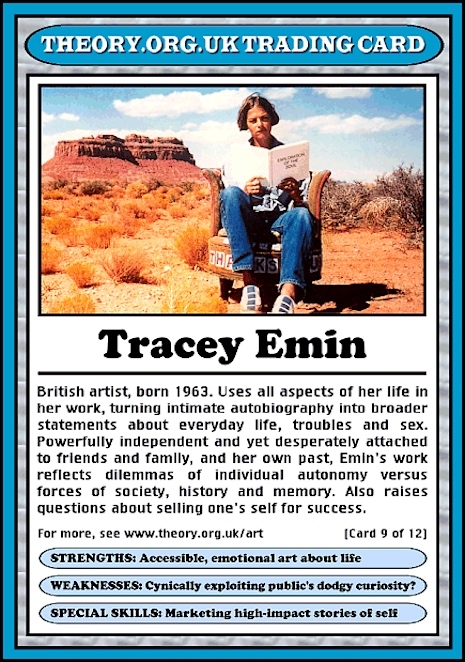
#9 Tracey Emin—British artist.

#10 Gilbert & George—Italian/British artists.
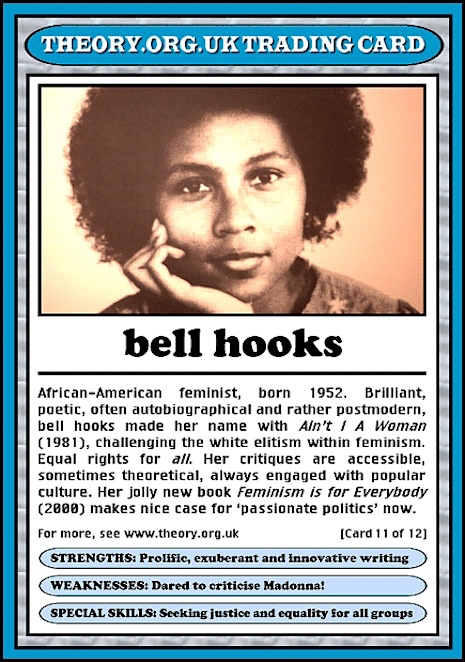
#11—bell hooks (aka Gloria Jean Watkins)—African-American author, feminist and social activist.
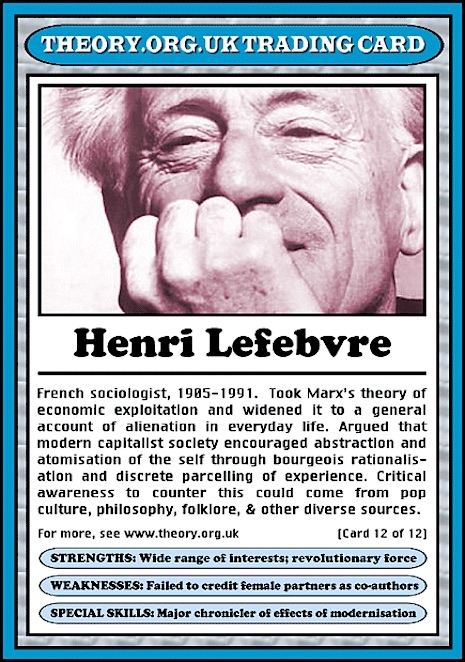
#13 Henri Lefebvre—Marxist philosopher and sociologist.

Unofficial Card #13: Edward Said—philosopher and writer. (Made by Jacob Ramsay of Australian National University to illustrate a lecture on Said.)
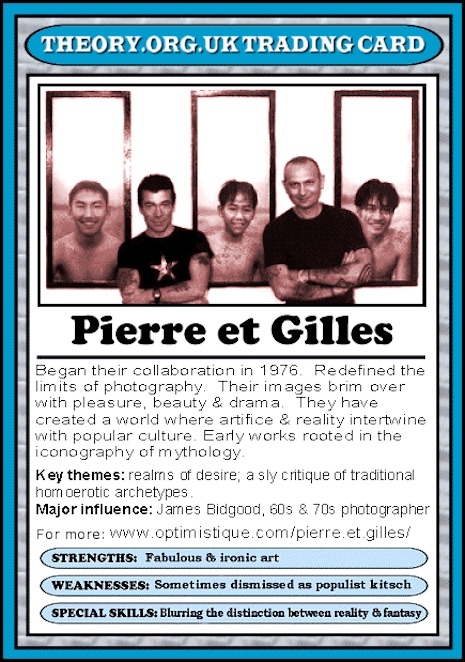
Unofficial Card #14: Pierre et Gilles—French artists/photographers. (Made by Yvonne Aburrow of the University of Bath.)
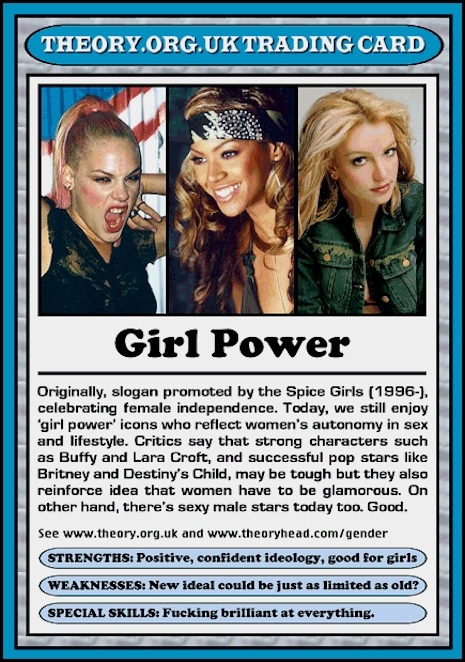
Unofficial Card #15: Girl Power. (Made by Sophie of Amsterdam.)
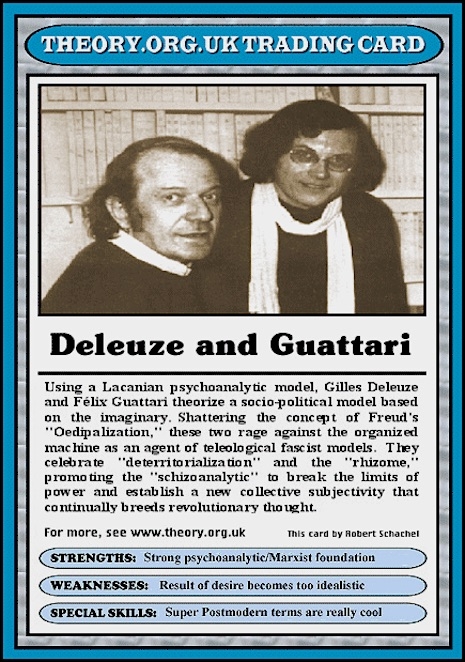
Unofficial Card #16: Deleuze and Guattari.—French philosopher and psychiatrist and social activist. (Made by Robert Schachel of University of Florida.)
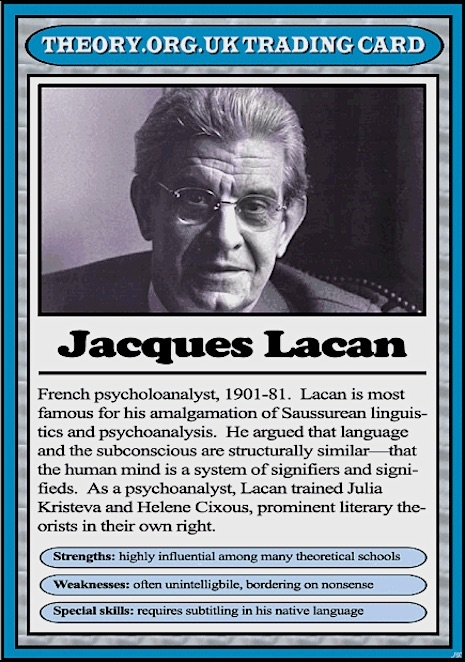
Unofficial Card #17: Jacques Lacan—French psychoanalyst and psychiatrist. (Made by Josh G in Providence, Rhode Island.)
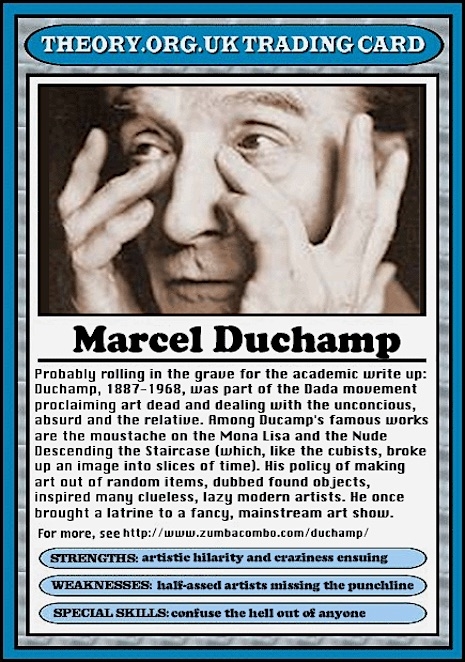
Unofficial Card #18: Marcel Duchamp—French-American artist. (Made by John Gehron.)
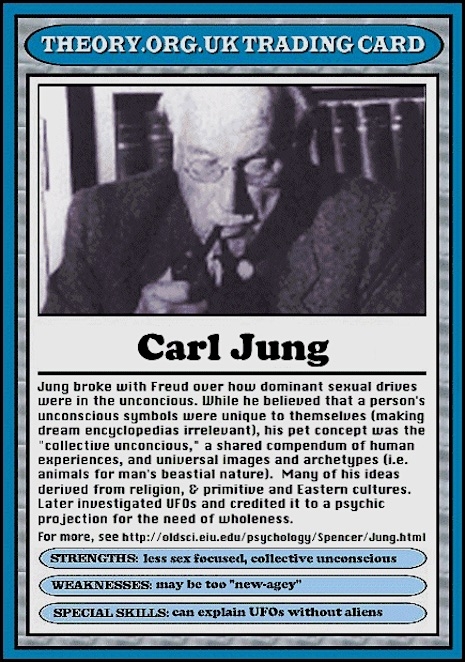
Unofficial Card #19: Carl Jung—Swiss psychiatrist and psychoanalyst. (Made by John Gehron.)
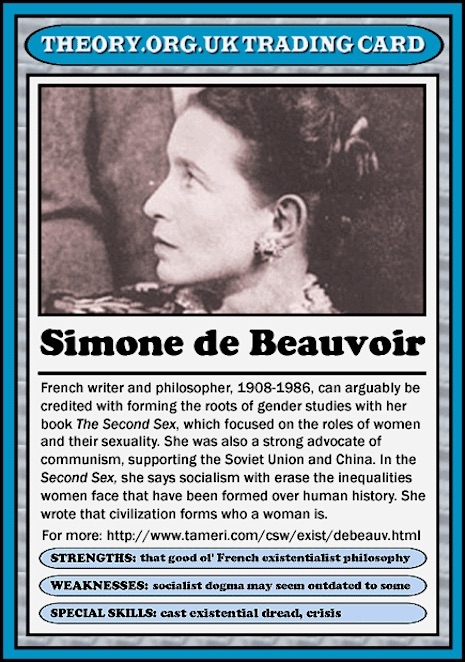
Unofficial Card #20: Simone de Beauvoir—French writer, existentialist philosopher, political activist, feminist and social theorist. Made by John Gehron.
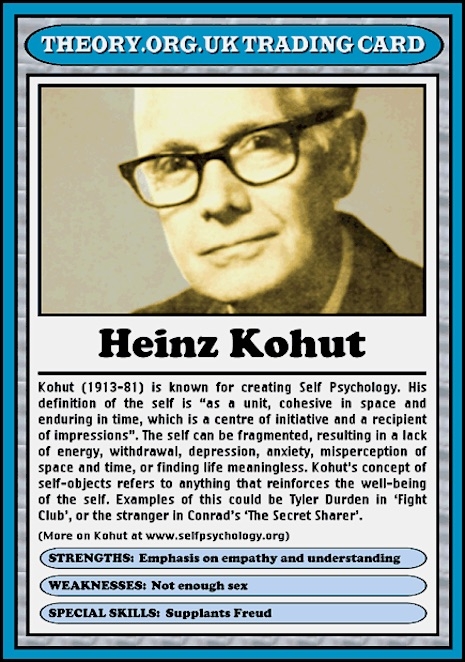
Unofficial Card #21: Heinz Kohut—Austrian-American psychoanalyst. (Made by John Gehron and Theory.org.)

Unofficial Card #22: Plastic. (Made by ‘Snarkism’, Australia.)
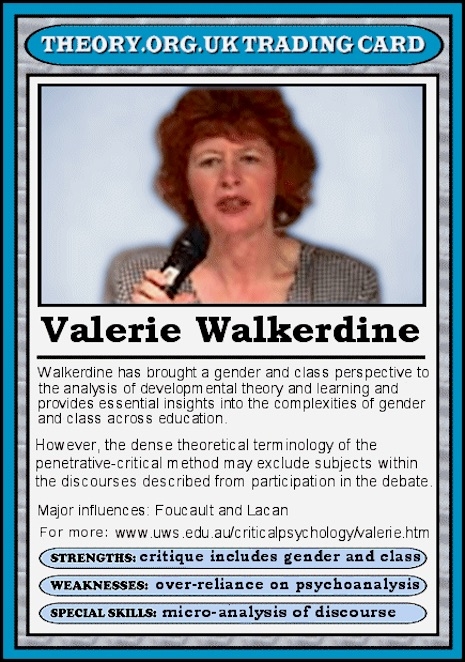
Unofficial Card #23: Valerie Walkerdine—gender theorist, social psychologist and writer. (Made by Yvonne Aburrow of the University of Bath.)
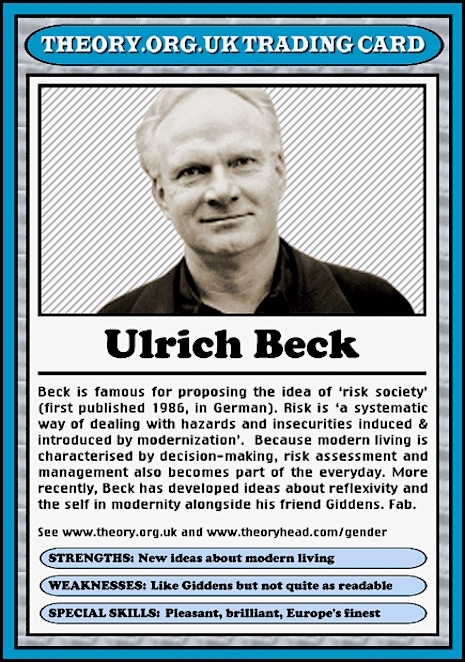
Unofficial Card #24: Ulrich Beck—German sociologist. (Made by Sophie of Amsterdam.)

Unofficial Card #25: Karl Marx—German philosopher, economist, sociologist, journalist, and revolutionary socialist. (Made by Kevin Lande.)
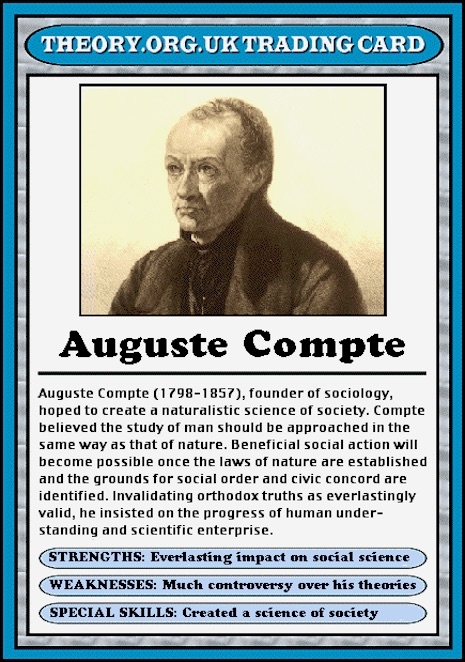
Unofficial Card #26: Auguste Comte—French philosopher and founder of sociology. (Made by Kevin Lande.)
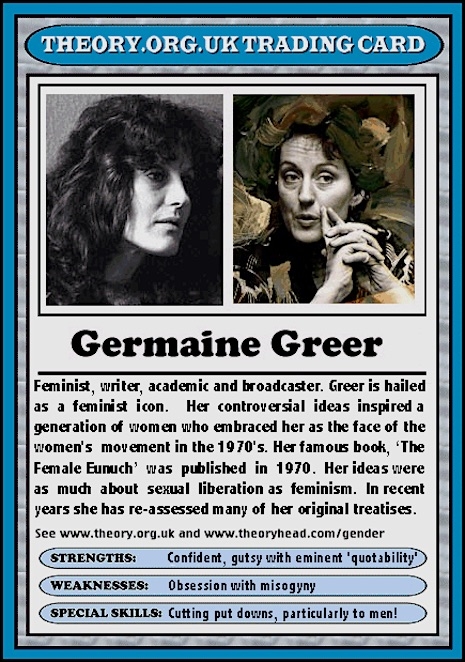
Unofficial Card #27: Germaine Greer—Australian writer and feminist. (Made by Kylie Robinson of Leeds, UK.)
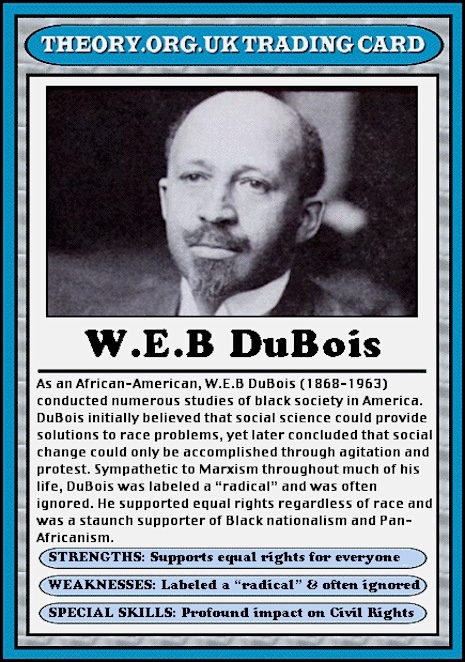
Unofficial Card #28: W. E. B. DuBois--American sociologist, historian, civil rights activist, Pan-Africanist, author, and editor. (Made by Kevin Lande.)
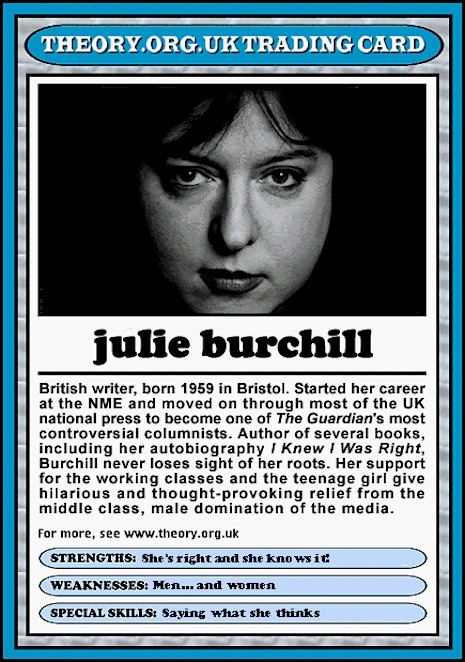
Unofficial Card #29: Julie Burchill—English writer and journalist. (Made by Tara Moneytooth.)
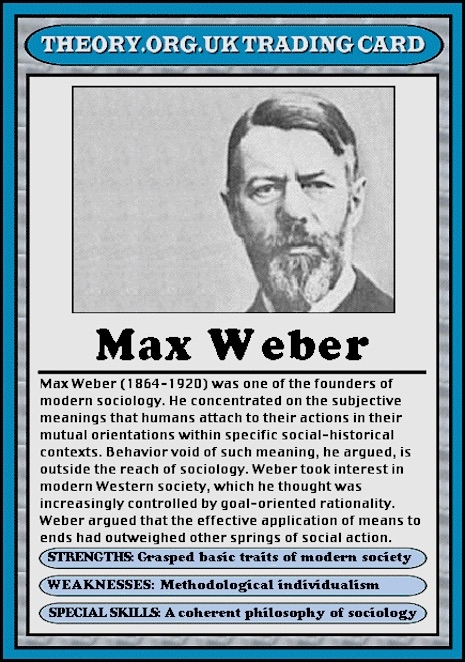
Unofficial Card #30: Max Weber—German sociologist, philosopher, jurist, and political economist. (Made by Kevin Lande.)

Unofficial Card #31: Walter Benjamin—German Jewish philosopher and cultural critic. (Made by Fabian Thomas.)
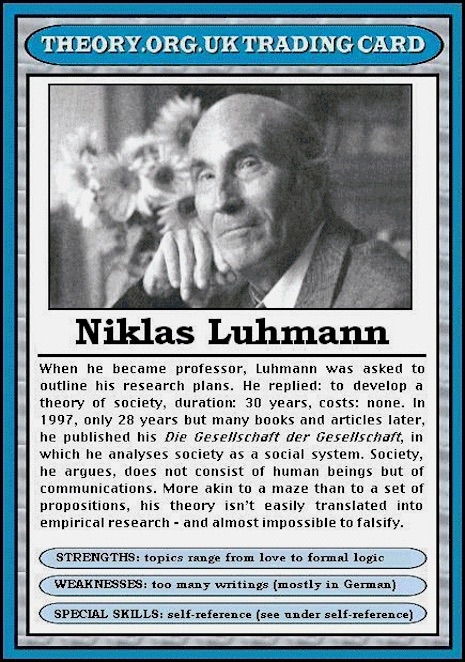
Unofficial Card #32: Niklas Luhmann—German sociologist and writer. (Made by Ludwig-Maximilians-Universität, München.)
Via Theory.org.

#1 Anthony Giddens—British social theorist.

#2 Judith Butler—American philosopher and gender theorist.

#3 Michel Foucault—French philosopher, theorist, philologist and literary critic.

#4 Psychologists.

#5 Postmodernity.

#6 Erving Gofffman—American/Canadian sociologist and writer.

#7 Theodor Ardorno—German philosopher, sociologist and composer.

#8 Psychoanalysis.

#9 Tracey Emin—British artist.

#10 Gilbert & George—Italian/British artists.

#11—bell hooks (aka Gloria Jean Watkins)—African-American author, feminist and social activist.

#13 Henri Lefebvre—Marxist philosopher and sociologist.

Unofficial Card #13: Edward Said—philosopher and writer. (Made by Jacob Ramsay of Australian National University to illustrate a lecture on Said.)

Unofficial Card #14: Pierre et Gilles—French artists/photographers. (Made by Yvonne Aburrow of the University of Bath.)

Unofficial Card #15: Girl Power. (Made by Sophie of Amsterdam.)

Unofficial Card #16: Deleuze and Guattari.—French philosopher and psychiatrist and social activist. (Made by Robert Schachel of University of Florida.)

Unofficial Card #17: Jacques Lacan—French psychoanalyst and psychiatrist. (Made by Josh G in Providence, Rhode Island.)

Unofficial Card #18: Marcel Duchamp—French-American artist. (Made by John Gehron.)

Unofficial Card #19: Carl Jung—Swiss psychiatrist and psychoanalyst. (Made by John Gehron.)

Unofficial Card #20: Simone de Beauvoir—French writer, existentialist philosopher, political activist, feminist and social theorist. Made by John Gehron.

Unofficial Card #21: Heinz Kohut—Austrian-American psychoanalyst. (Made by John Gehron and Theory.org.)

Unofficial Card #22: Plastic. (Made by ‘Snarkism’, Australia.)

Unofficial Card #23: Valerie Walkerdine—gender theorist, social psychologist and writer. (Made by Yvonne Aburrow of the University of Bath.)

Unofficial Card #24: Ulrich Beck—German sociologist. (Made by Sophie of Amsterdam.)

Unofficial Card #25: Karl Marx—German philosopher, economist, sociologist, journalist, and revolutionary socialist. (Made by Kevin Lande.)

Unofficial Card #26: Auguste Comte—French philosopher and founder of sociology. (Made by Kevin Lande.)

Unofficial Card #27: Germaine Greer—Australian writer and feminist. (Made by Kylie Robinson of Leeds, UK.)

Unofficial Card #28: W. E. B. DuBois--American sociologist, historian, civil rights activist, Pan-Africanist, author, and editor. (Made by Kevin Lande.)

Unofficial Card #29: Julie Burchill—English writer and journalist. (Made by Tara Moneytooth.)

Unofficial Card #30: Max Weber—German sociologist, philosopher, jurist, and political economist. (Made by Kevin Lande.)

Unofficial Card #31: Walter Benjamin—German Jewish philosopher and cultural critic. (Made by Fabian Thomas.)

Unofficial Card #32: Niklas Luhmann—German sociologist and writer. (Made by Ludwig-Maximilians-Universität, München.)
Via Theory.org.
Labels:
education,
intellectuals,
marx,
Politics,
psychology,
thinkers,
trading cards
Wednesday, September 28, 2016
My 1986 RUN-DMC Jacket
and how I almost lost it and possibly more...
from my Instagram +

Next thing i know i got a fist in the face! And im on the ground in a low lit area and i got six Jheri curled teenagers lookin down at me, and I'm asking WHAT THE FUCK? Next thing i know another fist in the face and the kid says "give us your jacket!" And I'm like what the fuck again, "there's only one jacket like this in LA, it's even got my name sewn in it, it was given to me by the group, what the fuck are you gonna do with this?" BAM! I get hit in the face again, "Shut up and give us the fucking jacket!" Now i'm thinking to myself, damn there's six kids and one jacket, these kids are gonna fuck me up! Then im thinking oh shit my license and credit card are in my small wallet in my inside breast pocket, fuck, I don't wanna have to deal with getting a new license at the DMV and calling up to halt my credit card, FUCK! I get hit again, "Give us the fucking jacket!" " OK, OK, OK, here take the fucking jacket, but as I'm taking it off i reach in to grab my license and wallet... Next thing i know they all run away...
WHAT THE FUCK? Cool, i still got my jacket and my ID, etc and continue walking home... Like a fool i get home and after putting some ice on my face i head out in my car to find these kids (leaving my jacket in the car) to find out what the fuck were they thinking? Lucky for me probably i never found them...
An hour later i head out to a night club called Power Tools, the cool hang at that point in time, half the dust brothers posse DJ'd there before there was such a thing as the dust brothers, i run into my homie ICE-T and tell him the story... He says "Glen you're crazy, you wanted to go back and ask them what they were thinking?? They weren't thinking you fool, thats why they do shit like that!" And as for them running away? "Obviously they thought when you went to get your ID and shit out of your pocket, they thought you were pullin' out a 'gat' and that you were gonna shoot them!" Nooo waaaay... Damn, street knowledge lesson #434... I still got my coat, and thats all the truth.
Tuesday, September 27, 2016
Monday, September 26, 2016
School of Life Monday:
Why We Hate Cheap Things
In assessing what material things are important and worth paying attention to, we’re oddly prejudiced against cheapness – and frustratingly drawn to the expensive, for reasons that don’t necessarily stand up to examination.
Labels:
"school of Life",
capitalism
Sunday, September 25, 2016
The National Museum of African American History
is now open
We All must visit.
Here's a great piece from the New York Times http://nyti.ms/2cMOncG

I am honored to have a few photographs I've made on display here.
Saturday, September 24, 2016
Saturday lesson:
RACE BAITING 101
The books the maker of this video is recommending in this video are PEOPLE'S HISTORY OF THE UNITED STATES by Howard Zinn and THE NEW JIM CROW by Michelle Alexander.
Labels:
amerikka,
history,
incarceration,
injustice,
Police Brutality,
Slavery,
war on drugs
Friday, September 23, 2016
Political Lesson of the week:
Senator Elizabeth Warren speaks to Wells Fargo Bank CEO
(must see video)
Sen. Elizabeth Warren (D-MA) to Wells Fargo CEO John Stumpf: "You should resign. You should give back the money that you took while this scam was going on and you should be criminally investigated by both the Department of Justice and the Securities & Exchange Commission." Watch the complete Senate Banking Cmte hearing here: http://cs.pn/2cjHUTH
Labels:
banks,
capitalism,
elizabeth warren,
government,
Politics,
regulation,
thieves,
wells fargo
Thursday, September 22, 2016
Keith Morris:
With release of memoir 'My Damage,' vocalist reflects on 40 years of punk adventures
GET KEITHS BOOK at your local shop or HERE.

This images is the collaboration I did with Keith, and Shepard Fairey last year, NOT the book's cover ;-)
from Rolling Stone magazine

This images is the collaboration I did with Keith, and Shepard Fairey last year, NOT the book's cover ;-)
from Rolling Stone magazine
"I have a horrendous personality," Keith Morris says in the same flat, wry tonality he sings in. Then he laughs. "I'm also a loudmouth and I'm very quick to snap at people. I get accused of this all the time. So I'm sitting here on my couch, and I'm raising my right hand: 'Yes, I am an asshole. I am a prickface. I am abrasive.' Somebody has to be that."
The firecracker singer, who has spent legendary stints in hardcore trailblazers Black Flag, punk agitators Circle Jerks, the supergroup Off! and even something called Midget Handjob, has spent a lot of time lately evaluating his personality as he recounted his life for a recently released memoir, My Damage: The Story of a Punk Rock Survivor. In its nearly 300 pages, he parses a rough childhood of being bullied and clashing with his father, tells stories of drug abuse mixed with managing diabetes ("I'm celebrating 80 years of sobriety," he jokes with Rolling Stone), and provides an inside look at the fragility and jealousies that have torn apart some of the American underground's most vital bands.
The ever-acerbic singer, who turns 61 Sunday and has most recently teamed up with former Black Flag members in a group called Flag, spent more than an hour speaking with Rolling Stone about the lessons he learned from poring over his life story.
What did you learn about yourself from writing this book?
I learned that I'm a very lucky and fortunate person. I got away with a lot of crap [laughs]. I've had a great time and I'm still having a great time. We can use punk rock as an excuse to do stupid things and we can use it to try to better the world.
What do you think your fans will make of your stories?
I'm getting ready to polish off my Knights of the Round Table outfit because the punk-rock ethics committee will be rearing their ugly heads [laughs]. "You're not cool because you said this or did that." They have a whole selfish outlook: "It's for us and not anybody else." In certain parts of the book, I talk about bands like the Grateful Dead. And that's, like, "Nein, nix to that," because that's not punk rock.
The whole concept of a "punk-rock ethics committee" seems oxymoronic.
When we started playing music – if you want to call making noise that – we didn't care about anybody's rules. It was the freedom to do what we want. There was this clique in Los Angeles, and I recently read John Doe's book about that scene. But to us it was very cliquish. It was just like, "This is our clubhouse and you're not allowed here." So we had to eventually prove ourselves but it was an amazing experience.
In your book, you write, "All my life I've pushed the limits and I put myself in situations I had no business walking away from." When you think about your life, why do you think that is?
Maybe I'm bulletproof or invisible or an immortal [laughs]. I don't believe that anybody's smiling down on me, but I do believe that you experience a lot of positive and negative energy. I just believe that you try to be good and hold on to all of your positive energy. Maybe that played a role in having survived all the things I've survived. Maybe I have some kind of inner light. Now I'm getting all hippy-dippy-trippy and philosophical and all that wonderful stuff, and that's OK. I don't believe things in our world are getting better so you try to make your life as good as you can make it. You better yourself.
One of the people you dedicated your book to is your mom. Who influenced your life more, your mother or your father?
My mom was always encouraging. She'd tell me to go out and have fun and see the world. My dad was really uptight, but I probably spent more time around him than my mom because I was working for him from when I was seven-and-a-half years old. But I think they were pretty even. And it's like, I don't want to be like my parents. I certainly didn't want to be like my dad.
In your book, you make it sound like you and he clashed over music a lot.
I'm finding out that I'm very much like him. In the last few years, when I go to record stores to buy some punk or psychedelic or classic rock, I always go into the jazz section and pick up something that pokes me in the eye: Ornette Coleman, John Coltrane, Pharoah Sanders, Yusef Lateef, Art Blakey and the Jazz Messengers. But I'm not the kind of guy who can raise his hand and go, "Well, I know who that is."
Isn't it funny how your taste expands, as you get older? You wrote about how your dad listens to jazz and didn't like the posters you had up in your bedroom.
I had a Kiss photo on the wall, and my old man was just like, "Are you a fag?" [Laughs] At the time, I wasn't interested in anything but listening to loud music, smoking pot, doing some drugs and hanging out with my friends. Now that I'm old enough to be my dad, I've acquired some of his tastes.
What do you think attracted you to louder, more aggressive music?
Part of it could be listening to what my dad listened to [laughs]. But see, he went back and forth between jazz and classical – two amazing art forms. But when you're young, it's like you have that ingrown hair in your tuchus and you don't want to be a part of that: us versus them, youth versus authority.
In your book, you mention in passing going to the final Sex Pistols concert in San Francisco. What do you remember about that?
I just remember that they turned Sid Vicious' amp down. They didn't turn it off, but they turned all the knobs to zero because he was just a blithering mess [laughs]. And Paul Cook doesn't get the credit he deserves for being a powerhouse of a drummer. I remember sitting to the side of the stage and watching him play and paying close attention to what he did with his kick drum and pedal. He was badass. But I remember them being really, really good but very sloppy, which is totally appropriate. And the local bands were really good; the Avengers came out and played like they meant business, like they were playing with one of the greatest bands of our genre so they stepped it up several notices. And they did. It was a fun show. The whole trip was fun. Hanging out in the San Francisco airport, waiting on the flight with all the people form L.A. that had flown up there was fun.
Going back to Black Flag, you wrote that the rehearsal schedule that bassist Chuck Dukowski set wore you out. Now that you're in the band Flag with him, have you talked about how you felt back then?
He knew how I felt. I can point a finger at Chuck but I can also point one at Greg and Robo. In that lineup, we were all bros. We were pals. We were friends. And when you're in a group and surrounded by people and learning their personalities, you start thinking, "Do I really want to be around these people?" Mentalities change and money certainly changes everything. But the rehearsal schedule was hectic, almost like clockwork. And it became very regimental. It sucks out a lot of the fun. If you're in a band and you're not making money, you better be making a lot of whoopee and having a really great time.
But how did you mend that rift with him?
I had some difficulties with Chuck, but we just got through touring Europe for two weeks and I had a blast. I was actually having fun. I had a conversation with Billy [Stevenson], our drummer, and said, "You know, Bill, my main gripe with Chuck was he was the one who would tell me to go fuck myself."
At one point I had decided to step up and ask for royalties, so I called SST in the Eighties – and this is a big sticking point with just about everybody that's dealt with that label – but we started talking about money and that made things ugly. But we gotta live. We gotta survive. A lot of us have chosen a path where we certainly aren't padding our retirement funds. When I called, the conversation with Chuck was very brief. It was, like, five minutes. So I had a beef with Chuck. I'm over it, though, because Chuck explained that the whip was being cracked by the Big Boss Man. And there were a lot of head games going on.
When is the last time you spoke to SST's Big Boss Man, Greg Ginn?
2003.
In the index of the book, under Greg Ginn, you can look up "Greg Ginn as reputed mastermind of Black Flag." That seemed a bit sarcastic as far as indexes go.
When this comes up, it's like, it's not Black Flag unless Greg Ginn is part of it. And I've heard a couple of different stories as to what's going on with him. I won't repeat them, but they're not good stories. We [in Flag] had the situation where he started up Black Flag again and took them out on the road and there were people who were excited about it and people who were very, very, very much turned off by it. We found ourselves in a position where not only were we not talking to him but we didn't really want to talk to his lawyer either. And he sued us [over the name] and we had not done anything wrong.
Some people will say, "Well, you did this behind his back." And, "Keith Morris is this sneaky son of a bitch." There was a powwow among some of us and we decided that we needed to do this because the time was right. Because of the lawsuit, some ugly stuff came up, and I don't really want to get into that because I could start badmouthing people and I'm really good at doing that.
When he sued you in 2013, he claimed that you and Henry Rollins had gotten together and attempted to trademark the band's name and logo.
There was much more involved than that and ultimately we found out because you have to deal with Washington, D.C. The name Black Flag is owned by a Japanese clothing company. Henry and I did get the four bars. But it was about Henry and Kira [Roessler] and Dez [Cadena] and Robo and Brian Migdol.
What was your aim when you tried to trademark the name Black Flag?
We knew where the original tapes were and we were going to put out the records with photos and liner notes with everybody involved stepping up and writing a paragraph or two or three, writing the story of being in the studio. We were going to remix them and remaster them. Everything was going to be souped up. Henry had his own record label.
We were going to put it out the way it was supposed to be for modern times – as Henry Rollins said, for the fans. The mindset was it's for everybody. We're not doing this for Henry Rollins and Keith Morris; we're doing it for all the people who were involved. We wanted to make sure that Spot, who produced the records, was going to get compensated. We were going to go right down the Black Flag catalogue. Maybe we'd have some Descendents stuff floating around. It'd be whatever Spot worked on. He was going to play a role in this and receive the reward.
And we'd make sure that [Greg Ginn's brother, illustrator and Black Flag cover artist] Raymond Pettibon, who was one of the first people I talked to before Henry Rollins suggested we do this ... He said, "I've never been paid. My brother's treated everybody really shitty, and I don't want to have a part of it so you have my permission to go for it. You guys deserve it." Those were his words, and I'll never forget that. It wasn't some egotistical swoop. It was to do good for everybody.
Well, Raymond in particular named the band and created the logo – the definitive punk tattoo.
Greg Ginn came up with the name Rope. There were three of us shaking our heads, looking at each other saying, "No, I can't be in a band called Rope."
Has this reissue project been totally kiboshed?
It has.
That's too bad.
Yeah. Chuck and I received some very scathing, uncalled-for, nasty emails that I can't repeat. We've been disowned [laughs]. We are no longer friends [laughs]. And everybody's supposed to be friends and friendly and nice to each other. That got tossed out the window.
Moving on from the lawsuit, how has it felt for you to revisit all those songs with Flag?
I love the energy. I understand that the songs are very important to people. With Flag, we have quality control. Our drummer is a slave driver. We're not playing unless we rehearse.
You describe Off! in your book as being the most liberating project you've ever done. Why is that?
Well, for years I've been attached to the Bad Religion schedule [because Circle Jerks co-founder Greg Hetson played with them]. And I'm not here to badmouth them because I love them. They're great guys and it wasn't their fault but it was somebody else's fault [Hetson's] for deciding to make Bad Religion the priority, the number one thing in life – besides whatever women were running around. And because of that, whenever it was the Circle Jerks' turn, we were under a time constraint. It just wasn't happy times. And some stuff happened that was really unfair and uncalled-for, and I was going through everything I'd been through in Black Flag again in the Circle Jerks.
So I said screw this. I'm not happy or having fun. I'm barely able to eke out a living, pay my bills, buy a couple of CDs here and there. But in the last five-and-a-half years, I've never been this busy. [With Circle Jerks] we got offer after offer but we would let opportunities like that pass us by. For a band that's 33 years old, there's something wrong with that. So I reached the point where I said enough is enough.
Lastly, you've had dreadlocks for decades. What's the hardest thing about keeping them?
A doctor told me that the weight of the hair actually creates problems for your neck. And I've cut them a few times because I had experiences where I'd get in my car, I'd close the door and I'd go to look in to the rearview mirror and I couldn't turn my head because my hair was caught in the door. But I wash them once a week and they're really no problem.
Labels:
autobiography punk,
BLACK FLAG,
circle jerks,
keith Norris,
survivor
Wednesday, September 21, 2016
‘CUTE’ GREETING CARDS
from Dangerous Minds














jus' sayin'

Greeting cards are a dicey affair, either they’re sentimental or there’s a joke with a big—often unfunny—punchline. This is why I prefer my messages with a little black humor in them. You know the person giving you the card loves you, so it’s just fine if you give or get a little abuse in with the bargain. (Cards given in a semi-obligatory way in an office context don’t count.)
That said, a cuddly narwhal avowing your overly pudgy status and an adorable panda testifying that nobody is proud of you?! That’s taking it too far!!
Anyway, I love these. The artist is named Phil Wall if you are wondering. He was doing some rough sketches and put them up on Facebook where they got a very enthusiastic response. As he points out, the phrasing is more British—it’s a lot more common for people to call each other “cunts” as a playful put-down in the U.K.!













jus' sayin'
Labels:
funny,
greeting cards,
rude,
silly
Subscribe to:
Posts (Atom)

